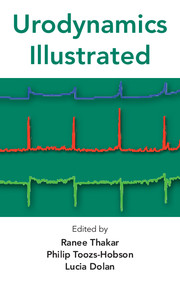Book contents
- Frontmatter
- Contents
- About the authors
- Acknowledgements
- Glossary and abbreviations
- Preface
- 1 Introduction
- 2 Setting up the equipment
- 3 Flow rate testing
- 4 Cystometry
- 5 Videocystourethrography
- 6 Ambulatory urodynamic monitoring
- 7 Urodynamic artefacts
- 8 Assessment of urethral function
- 9 Bladder diaries
- 10 Pad testing
- 11 Pre-test assessment using questionnaires
- 12 Ultrasound as a tool in urodynamics
- Index
11 - Pre-test assessment using questionnaires
Published online by Cambridge University Press: 05 February 2014
- Frontmatter
- Contents
- About the authors
- Acknowledgements
- Glossary and abbreviations
- Preface
- 1 Introduction
- 2 Setting up the equipment
- 3 Flow rate testing
- 4 Cystometry
- 5 Videocystourethrography
- 6 Ambulatory urodynamic monitoring
- 7 Urodynamic artefacts
- 8 Assessment of urethral function
- 9 Bladder diaries
- 10 Pad testing
- 11 Pre-test assessment using questionnaires
- 12 Ultrasound as a tool in urodynamics
- Index
Summary
Why use quality of life questionnaires?
Lower urinary tract symptoms cause significant health-related quality of life impairment for sufferers. In clinical practice, a physician's assessment of the disease burden is inaccurate and non-reproducible and physicians often underestimate the impact of lower urinary tract symptoms on patients' quality of life. Patients report higher subjective distress in questionnaires than structured interviews. To optimise the management of symptoms, it is important that their impact is assessed in a meaningful manner.
Lower urinary tract symptoms and their impact can be measured in several ways; however, the only validated way of measuring the patient's perspective is through the use of psychometrically robust self-completion questionnaires. Questionnaires should only be used if they provide a valid, reproducible, rapid assessment of patient-reported disease impact, which can elicit symptom impact and which is also useful for the evaluation of treatment efficacy.
The King's Health Questionnaire
Features
The King's Health Questionnaire (KHQ) is a condition-specific, self-completion questionnaire (Table 11.1). It was developed and validated following six pilot studies. These studies demonstrated good validity and reliability. The KHQ has been extensively used in pharmaceutical clinical studies.
Keywords
- Type
- Chapter
- Information
- Urodynamics Illustrated , pp. 123 - 134Publisher: Cambridge University PressPrint publication year: 2011



